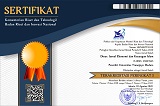Pengembangan Ekonomi Kreatif Dalam Bank Sampah Syariah (BSS) Pesisir Untuk Mewujudkan Masyarakat Madani THE DEVELOPMENT OF CREATIVE ECONOMY IN THE ISLAMIC WASTE BANK TO REALIZE CIVIL SOCIETY
Abstract
The creative economy is synonymous with the idea and management of waste banks in it must be accompanied by various ideas or ideas of progress so that later they will not lose in the arena of global competition. That, will be an alternative to minimize waste scattered along Branta village, especially on the lips of the Branta Coast and will in fact realize the Madani community so that later halal life styles will still exist in the Madurese community in general and the Branta community in particular.
The formulation of the problem in accordance with the context is how is the creative economic development system of the coastal Sharia Bank and what is the concept of managing the sharia coastal bank in Branta Class III to adopt the Madani community? Therefore the goal can easily be known to find a good and suitable system in developing the creative economy in the form of coastal waste banks and to know what concepts and how to manage pesisr waste banks which will eventually facilitate the realization of civil society.
The research method we used in this study is a qualitative descriptive methodology in which the data sources we obtain are primary data through observation, interviews and documentation from Branta residents and Branta coastal officers are also equipped with secondary data from various websites, journals, books, articles etc.
The results of this research are that the development of creative economy in Islamic sharia banks will not run smoothly if there is a lack of role of the three figures, besides that the products from the Islamic waste bank offered are quite varied.
Full Text:
PDF (Bahasa Indonesia)References
Departemen Agama, al-Quran dan terjemahannya, Surrabaya: Mahkota, 1989.
Hasan, Ali.Manajemen Bisnis Syariah,Yogyakarta; Pustaka Pelajar, 2009.
https://megapolitan .compas.com/read/2018/08/19/21151811.htm.,
Putra, Hijrah purnama. Dan Yuriandala, Yebi. “studi pemanfaatan Sampah plastik menjadi produk dan jasa kreatif” jurnal sains dan teknologi lingkungan, Vol. 2, No 1.Yogyakarta, januarai 2010.
Ekonomi%20kreatif%20%20Wikipedia%20bahasa%20Indonesia,%20ensiklopedia%20bebas.htl.
https://id.wikipedia.org/w/index.php?title=Ekonomi_kreatif&oldid=14061383.
Raharjo, M. Dawam.Masyarakat Madani: Agama, Kelas Menengah dan Perubahan Sosial,. Pustaka LP3ES, Cet. ke – 1, Jakarta, 1999.
https://fixguy.wordpress.com/makalah-masyarakat-madani/.
https://id.wikipedia.org/wiki/Bank_sampah
al-Quran Surah As-saba’ [34]: 15
Astuti, Ngudi. “Peran Umat Islam dalam Mewujudkan Masyarakat Madani di Indonesia” Jurnal Ilmiah Mimbar Demokrasi, Vol. 11, No 2. Jakarta, April 2012.
Silalahi, Ulber. Metode Penelitian Sosial. Bandung: Refika Aditama, 2010.
“Penelitian: Definisi, Metode, Tujuan, dan Paradigma”, (http://usupress.usu.ac.id/files/Metode%20Penelitian%20Bisnis_Final_normal_bab%20%201.pdf.
Pusat Komunikasi ekonomi syariah (PKES), Buku saku perbankan syariah. Jakarta: ttp, 2006.
Nor, Dumairi. dkk. Ekonomi Syariah versi salaf. Pasuruan: Pustaka Sidogiri, 2007.
Pusat Komunikasi ekonomi syariah (PKES). Buku saku perbankan syariah. Jakarta: ttp, 2006.
Sukmadinata,Nana Syaodih.MetodePenelitian Pendidikan. Bandung; Remaja RosydaKarya, 2007.
DOI: https://doi.org/10.21107/dinar.v4i2.5072
Refbacks
- There are currently no refbacks.
Copyright (c) 2019 Iklimah Iklimah, Siti khatijah

This work is licensed under a Creative Commons Attribution-ShareAlike 4.0 International License.
Journal Dinar Indexed by:
Dinar: Jurnal Ekonomi dan Keuangan Islam by Universitas Trunojoyo Madura is licensed under a Creative Commons Attribution-ShareAlike 4.0 International License.






.png)










